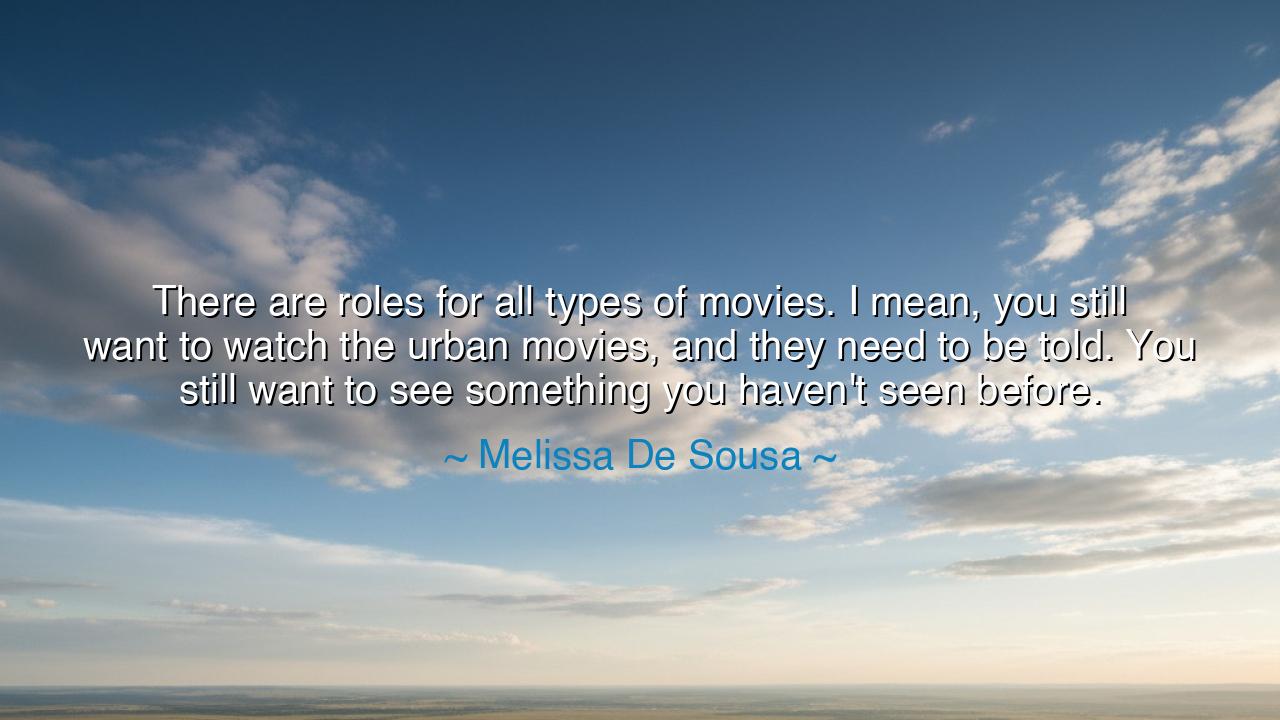
There are roles for all types of movies. I mean, you still want
There are roles for all types of movies. I mean, you still want to watch the urban movies, and they need to be told. You still want to see something you haven't seen before.






Hear now the words of Melissa De Sousa, a voice that speaks to the ever-evolving landscape of cinema: “There are roles for all types of movies. I mean, you still want to watch the urban movies, and they need to be told. You still want to see something you haven’t seen before.” In these words, De Sousa illuminates a profound truth: there is a place for all stories in the world, and every genre—from the gritty urban tales to the fantastical adventures—has something valuable to contribute. She reminds us that stories, in all their forms, have the power to connect, to teach, and to transport us into new realms of understanding.
In the ancient world, the storytellers—the bards, the philosophers, and the poets—knew that every tale had its own purpose. The epic poems of Homer told of gods and heroes, of wars and fates, and yet, they were not the only stories that needed to be told. The fables of Aesop, with their humble animals and simple lessons, carried truths just as powerful. The ancients understood that there is power in the diverse forms of storytelling. Whether grand and mythical, or humble and grounded in daily life, each story has its place in the tapestry of human understanding.
Consider the journey of Herodotus, the ancient historian who sought to tell the story of the Persian Wars not as a simple account of battle, but as a lesson in the interplay of cultures, the clash of empires, and the human condition. His tales were a melding of the grand and the personal, the historical and the moral. Herodotus understood that history is not just about the events that shape the world, but the stories of the individuals within it. In this same spirit, De Sousa’s words remind us that there is a place for both the urban stories, which ground us in the realities of the modern world, and the tales that push us into uncharted territory, that ask us to see something we have never seen before. Both are equally necessary.
Think, too, of Shakespeare, whose work spanned genres from comedy to tragedy, from the majestic Macbeth to the light-hearted Twelfth Night. He understood that to truly capture the full breadth of human experience, one must embrace every possible form of storytelling. Shakespeare’s versatility in genre was not just a matter of entertainment; it was his way of speaking to the multitudes of human emotion, of human experience. De Sousa’s reflection mirrors this, for it is only by embracing the full spectrum of storytelling that we can hope to understand the vast complexity of the human spirit.
There is also a lesson in De Sousa’s words about inclusivity. The urban stories she speaks of are the narratives that speak to the lives of those often left in the margins, those whose voices are rarely heard in the grander tales of history or cinema. These stories are often the ones that need to be told the most—stories of struggle, of community, and of resilience. By highlighting the importance of these narratives, De Sousa reminds us that every story, no matter how small or local, has the power to shape our understanding of the world. The telling of these stories is an act of acknowledgment and representation, allowing the richness of human experience to be seen in its full diversity.
In your own lives, O future generations, the lesson is this: embrace diversity in the stories you consume and the stories you share. Like the ancients, understand that every form of art and expression has its purpose. The great tales of heroes and battles are not to be discarded, but neither should we dismiss the quieter, more intimate stories of those around us. The world is made up of all these different threads, and to truly understand it, we must recognize the importance of every voice. De Sousa’s words encourage us to seek out the unseen, the untold, and to celebrate all stories, whether they challenge us, comfort us, or teach us something we have never encountered before.
Thus, O wise ones, let the diversity of the stories you encounter guide you to a deeper understanding of the world and of each other. Whether the story is one of the grand epics that shape the world, or the smaller urban narratives that reflect the struggles of our times, recognize the value in each. For in every tale, there is wisdom, there is truth, and there is the potential to learn something new. Like Shakespeare, who wove together the highs and lows of life, so too must you embrace every form of expression, knowing that it is through the fullness of these stories that we come to understand the richness of the world.






AAdministratorAdministrator
Welcome, honored guests. Please leave a comment, we will respond soon